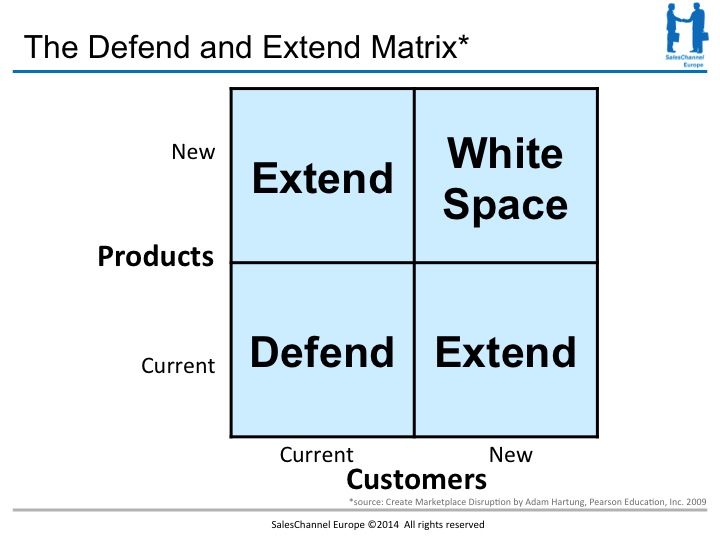Using the past to understand the future
When we look to the past to understand the future we compromise our ability to envision change and see a different possible future. Never take it for granted that your last successes will continue into the future. In fact, your past successes may be your biggest obstacle: every situation, every market, every customer engagement is different, and you cannot assume that what worked before will work today or tomorrow. You must cut yourself free from the past and open your eyes to the present.
“In times of rapid change, experience could be your worst enemy.” – J. Paul Getty
Here are 3 things that hold most organisations back:
1. Defend and Extend Mindset
For most people and organisations success is believed to come from defending and extending what was done in the past, every day, every week, every month and every year. Success is believed to come from seeking out extensions to prolong what was previously done successfully. In Defend and Extend thinking the manager’s first priority is to understand the existing business and work to maintain and continue what worked in the past. This means focusing on core capabilities, core customers, core services, core assets, core functionality – whatever is considered core to the business – and firstly defending the core and then secondly looking for incremental opportunities to extend it. Having done this, Defend and Extend Managers believe that the future will successfully take care of itself. They believe that avoiding mistakes is their No. 1 priority and they believe that those who don’t screw up are more likely to succeed than those who take chances.Defend_and_Extend_26.01.14
The longer management tries to Defend and Extend its old business, the larger the Reinvention Gap becomes. The larger the gap, the less likely a business will ever reinvent itself, innovate and create new growth opportunities.
Creating growth = disrupting or inventing your business
When we look to the past to understand the future we compromise our ability to envision change and see a different possible future. Never take it for granted that your last successes will continue into the future. In fact, your past successes may be your biggest obstacle: every situation, every market, every customer engagement is different, and you cannot assume that what worked before will work today or tomorrow. You must cut yourself free from the past and open your eyes to the present.
“In times of rapid change, experience could be your worst enemy.” – J. Paul Getty
Here are 3 things that hold most organisations back:
1. Defend and Extend Mindset
For most people and organisations success is believed to come from defending and extending what was done in the past, every day, every week, every month and every year. Success is believed to come from seeking out extensions to prolong what was previously done successfully. In Defend and Extend thinking the manager’s first priority is to understand the existing business and work to maintain and continue what worked in the past. This means focusing on core capabilities, core customers, core services, core assets, core functionality – whatever is considered core to the business – and firstly defending the core and then secondly looking for incremental opportunities to extend it. Having done this, Defend and Extend Managers believe that the future will successfully take care of itself. They believe that avoiding mistakes is their No. 1 priority and they believe that those who don’t screw up are more likely to succeed than those who take chances.Defend_and_Extend_26.01.14
The longer management tries to Defend and Extend its old business, the larger the Reinvention Gap becomes. The larger the gap, the less likely a business will ever reinvent itself, innovate and create new growth opportunities.
Creating growth = disrupting or inventing your business

2. Lock-ins
Lock-ins are driven by economic necessity and require the organisation to commit to a set of behaviours, structural process, or a cost base to achieve a perceived benefit. They effectively promote doing more of what worked in the past. Lock-ins create blindness to alternatives, reinforce the need to do more of the same and create sacred cows. Lock-ins create a culture of continuing the past at the expense of creating the future. They create a culture of maintaining the status quo.
Learn from the past, but don’t live there
3. Anchors
Anchors are those beliefs and values that tie your thinking to the fixed point in the past. Anchoring is a cognitive bias that describes the common human tendency to rely too heavily on the first piece of information offered (the “anchor”) when making decisions. During decision-making, anchoring occurs when individuals use an initial piece of information to make subsequent judgments. Once an anchor is set, other judgments are made by adjusting away from that anchor, and there is a bias toward interpreting other information around the anchor. Anchors are often expressed or justified as:
“we’ve seen this before, we need to do….”, “sure we tried that once and ….”, “Let’s ask Bill, he has over 30 years experience.”, or “that’s not the way we do it around here.”
Question: What are you going to do to break with the past and align your business with future growth?
Lock-ins are driven by economic necessity and require the organisation to commit to a set of behaviours, structural process, or a cost base to achieve a perceived benefit. They effectively promote doing more of what worked in the past. Lock-ins create blindness to alternatives, reinforce the need to do more of the same and create sacred cows. Lock-ins create a culture of continuing the past at the expense of creating the future. They create a culture of maintaining the status quo.
Learn from the past, but don’t live there
3. Anchors
Anchors are those beliefs and values that tie your thinking to the fixed point in the past. Anchoring is a cognitive bias that describes the common human tendency to rely too heavily on the first piece of information offered (the “anchor”) when making decisions. During decision-making, anchoring occurs when individuals use an initial piece of information to make subsequent judgments. Once an anchor is set, other judgments are made by adjusting away from that anchor, and there is a bias toward interpreting other information around the anchor. Anchors are often expressed or justified as:
“we’ve seen this before, we need to do….”, “sure we tried that once and ….”, “Let’s ask Bill, he has over 30 years experience.”, or “that’s not the way we do it around here.”
Question: What are you going to do to break with the past and align your business with future growth?
David Ednie
SalesChannel Europe
SalesChannel Europe

Lisez gratuitement chaque jour (5j/7) le quotidien Finyear.
Recevez chaque matin par mail la newsletter Finyear, une sélection quotidienne des meilleures infos et expertises de la finance d’entreprise.
Lien direct pour vous abonner : www.finyear.com/newsletter
Lisez gratuitement chaque mois :
- le magazine digital Finyear sur www.finyear.com/magazine
- la lettre digitale "Le Directeur Financier" sur www.finyear.com/ledirecteurfinancier
- la lettre digitale "Le Trésorier" sur www.finyear.com/letresorier
- la lettre digitale "Le Credit Manager" sur www.finyear.com/lecreditmanager
- la lettre digitale "Le Capital Investisseur" sur www.finyear.com/lecapitalinvestisseur
Recevez chaque matin par mail la newsletter Finyear, une sélection quotidienne des meilleures infos et expertises de la finance d’entreprise.
Lien direct pour vous abonner : www.finyear.com/newsletter
Lisez gratuitement chaque mois :
- le magazine digital Finyear sur www.finyear.com/magazine
- la lettre digitale "Le Directeur Financier" sur www.finyear.com/ledirecteurfinancier
- la lettre digitale "Le Trésorier" sur www.finyear.com/letresorier
- la lettre digitale "Le Credit Manager" sur www.finyear.com/lecreditmanager
- la lettre digitale "Le Capital Investisseur" sur www.finyear.com/lecapitalinvestisseur
Autres articles
-
Coinbase et Visa, un partenariat pour des transferts en temps réel
-
Brilliantcrypto, la nouvelle aventure play-to-earn basée sur la blockchain Polygon, arrive sur Epic Game Store
-
Nomination | Truffle Capital promeut Alexis Le Portz en qualité de Partner
-
IPEM Paris 2024 : 5500 participants au Palais des congrès
-
Pomelo annonce une Série A à 35 millions de dollars menée par Vy Capital







